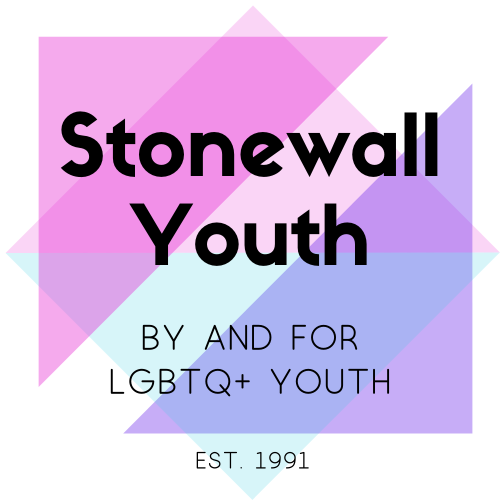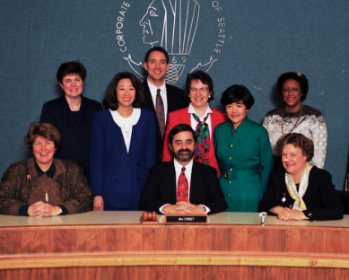"I am more than my race, more than my gender and more than my sexual orientation"
“In 1991 I made history by becoming the first openly gay African American lesbian to be elected to public office in the country. I won a citywide, at-large non-partisan election in a mid-size American city when everyone had told me it would be impossible to win because of my triple minority status.”
— Sherry Harris
As part of our 30 Things that Bring us Pride event, we’re highlighting events and people in our Northwest queer and trans history. In particular, we want to acknowledge the people who labored -- and those who are still laboring -- to make our communities safer and more welcoming for all LGBTQIA2S+ people.
Today we want to honor Sherry D. Harris. In 1991, Harris was elected to the Seattle City Council, becoming the first out black lesbian elected to public office in the United States. She was also the first African American woman to be elected to the Council. Harris served as an at-large City Council member from 1992 to 1995, meaning that she served on behalf of 536,000 constituents.
Harris won office by a large margin, defeating Sam Smith, a 24-year incumbent. (Smith had been the first African American elected to the Seattle City Council.)
When elected, Harris worked as an engineer at the Pacific Northwest Bell Telephone Company, and had long been involved in neighborhood activism through organizations such as Northwest Women’s Law Center, Association of Lesbian Professionals of Seattle, and Greater Seattle Business Association. She had been appointed to five city boards and commissions in the 1980s.
Harris had a B.S degree in Ergonomic Engineering from the New Jersey Institute of .Technology and a Masters in Business Administration. She was born in 1957 in Newark, New Jersey to a low-income single mother. She moved to Seattle after graduating from college to work as an engineer at Boeing.
Harris was the first candidate endorsed by the then newly-founded Gay & Lesbian Victory Fund, a national organization supporting LGBTQ people in politics.
Harris in Seattle's 1995 Pride Parade
Of her experience as a City Council member, Harris writes,
"My triple minority status proved to be controversial while I was in office, but it gave me a unique perspective on civil rights. As an African American and a woman, I had spent my life working toward equality and justice for all. I observed that lesbians and gay men were asking for the same equality of treatment and opportunity that African Americans, women and Native Americans had sought through the law. Yet, none of these groups saw a connection in their pursuits; nor were they working together, generally, toward common goals. Discrimination is discrimination. It only affects different groups and individuals within those groups by degrees depending upon who you are and the severity of maltreatment that the current societal trend allows.
I began to speak about strength in numbers by the promotion of joining each other in a common cause. I observed that one could pass progressive law, but that law could be reversed with the next election. I observed that passage of laws helped oppressed people in some ways, but did absolutely nothing to end prejudice and discrimination, such as in the case of African Americans.
I observed that when our nation pointed to inequities of opportunity and treatment, it was easy for leaders to wear blinders and do nothing, as in the case of the women’s movement.
I observed a country in total denial of genocide perpetrated against Native Americans. Frustrated by the amount of work I saw myself and others putting into the civil rights movement to no avail and without lasting results, I began to ask deeper questions. What creates lasting change in our culture? What can we all work on, and what problem can we solve which will address all issues of discrimination and oppression against anyone forever more?"
Sherry Harris (back, right) with the 1995 Seattle City Council
Harris continues,
"The answer I received is that we believe in and have a sense of separation from one another. We have adopted a cultural existence based on disconnection — that there is not enough – that only the fittest will survive.
I realized that our political salvation lies in adopting and living a new principle: We are all one. We are all connected on a level we have yet to even begin grappling with. Recognition of our oneness will solve all problems we have personally, politically, and globally. If you believe that you are connected to the person next to you, you will not pick up a hammer and hit that person, as you will realize you are, in fact, hitting yourself. We will all stop playing the game -- hammers hurt.
Midterm in office, I changed my message to one of unity. That message did not fit the paradigm of politics as it existed at the time. I am happy to be back in the private sector where I can be involved in public issues with my eye on the highest ideal and action we can all embrace which will have a domino effect ultimately giving up desired results across multiple issues."
Harris continues,
"Being a triple minority in public office also proved to be politically challenging. The media and the community places all of its elected officials in a box. A stereotype if you will, so that people can predict you. Was I from the left or from the right? People couldn’t figure me out.
There was no history of black lesbian elected officials from which to draw a conclusion. My independent streak and unique perspective on issues didn’t help. To make matters more challenging, the gay community demanded that I present myself only as “gay” and focus my attention on the gay community. The black community demanded I present myself only as “black” and focus exclusively on issues of concern to African Americans.
I am more than my race, more than my gender, and more than my sexual orientation. All of this intense energy was directed at a woman who ran for City Council on a neighborhood platform because of her love of land use and transportation issues.
The pressures were incredible but I’m very glad I did it. It is always difficult to be first. Someone has to forge the way. If there is a lesson for the gay community as well as the black community, which can be gleaned from my election, it is that we begin to honor and embrace our diversity. We are not a homogeneous species—each human is complex and multi-faceted. If we don’t learn to celebrate our differences we won’t be able to make a difference. I believe that every human being has come here to contribute to making a difference in his or her own unique way. Let us all learn to work together toward a shared vision, locally, nationally and globally."
-Sherry Harris, from OutHistory.org
While in office, according to BlackHistory.org, “Harris chaired the Council’s Housing, Health, Human Services and Education Committee and served on the Transportation and Utilities Committees. She sponsored or co-sponsored several gay-positive initiatives. She also helped to raise over $1 million to fight anti-gay ordinances in the state. Growing up in Newark with its poverty and lack of investment spurred her to promote downtown Seattle projects like the expansion of the Washington State Convention and Trade Center. In 1994, she successfully added an amendment to the Women and Minority Business Enterprise Ordinance to ensure a certain percentage of city contracts for women and minorities along with encouraging the city’s utilization of their businesses. She co-founded and chaired the Gay/Lesbian/Bisexual Caucus National League of Cities.”
Sherry Harris lost her re-election bid in 1995. She attempted a political comeback two years later but did not win the general election.
Sherry Harris from her website, Spirit Mind Body Educational Resources
"Politics has become corrupt, the system is broken, and democracy is now threatened. The time has come for a new approach to governance using transformational tools and holistic strategies"
-Sherry Harris, from her SMB website
In recent years, Harris founded Spirit Mind Body Education Resources. SMB Educational Resources is "an international organization teaching core skills for living consciously and generating intended results."
According to her website, Harris "now dedicates her life’s work to empowering people to wake up to their true potential, to live the life they have always wanted to live and achieve the personal, political and business results that support that vision. She gives inspiring and dynamic talks on life topics teaching how to be and live from your higher self. She empowers people to use metaphysical principles to consciously and deliberately create results in business and in life while modeling individually the change they would like to see in the world....Harris resides in Seattle, Washington and gives seminars and keynote presentations for business and government organizations worldwide."





